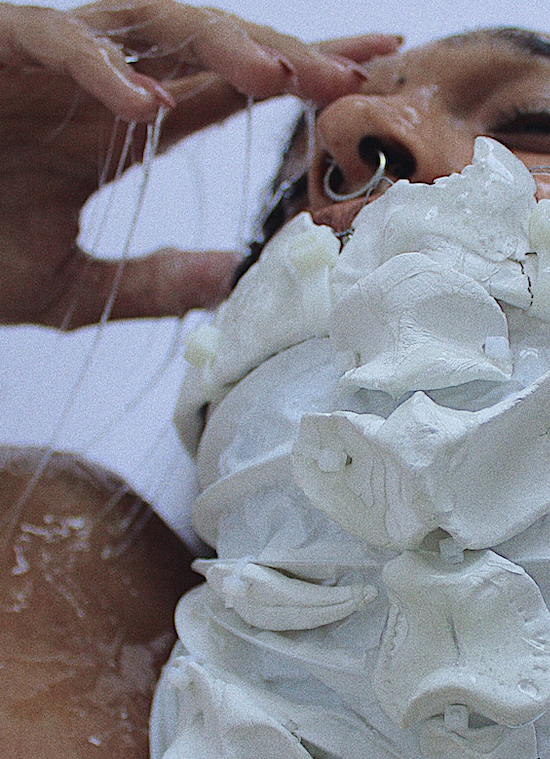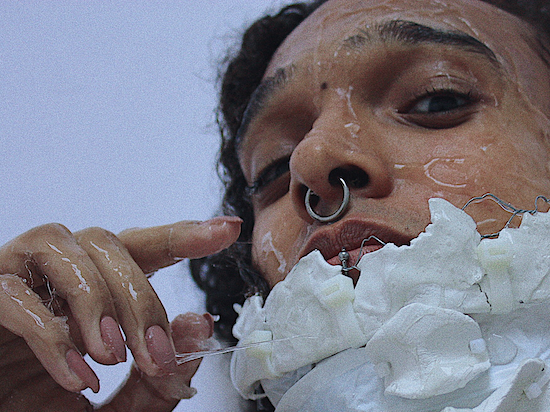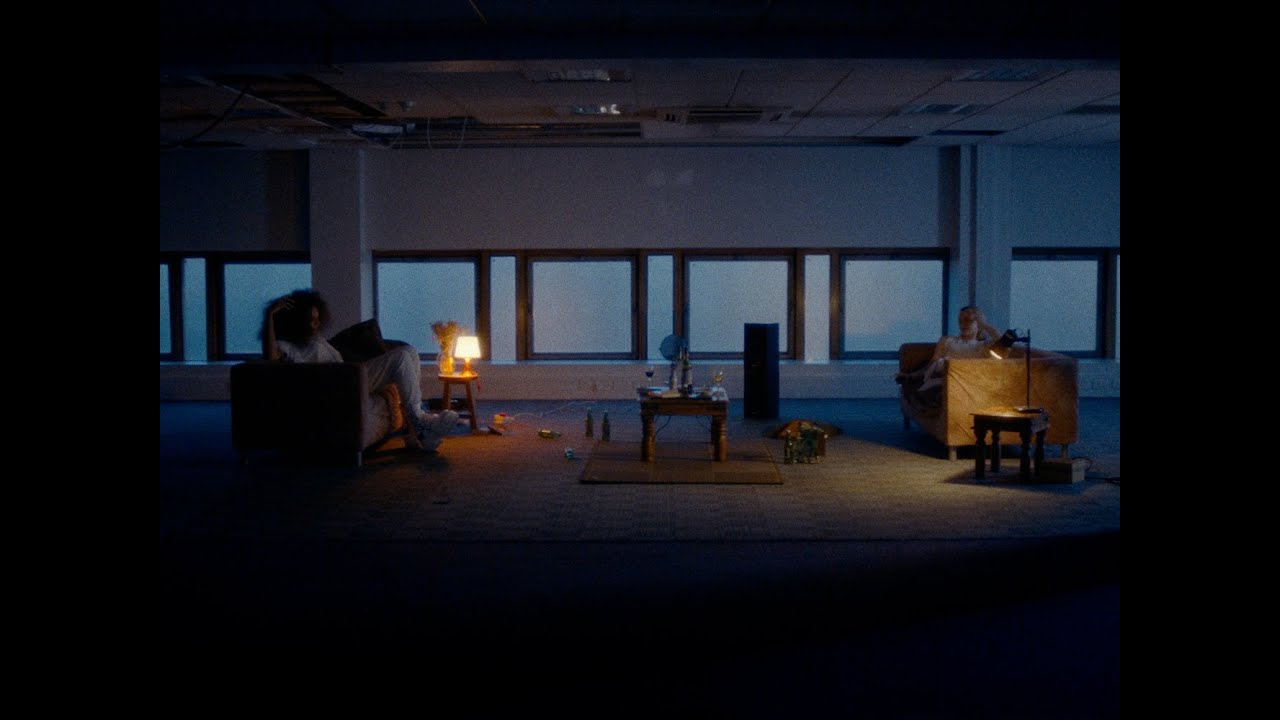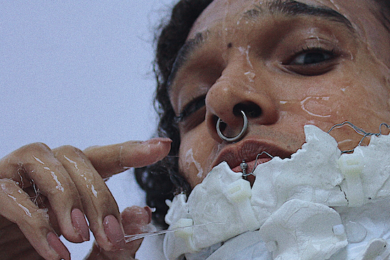Iceboy Violet, by Ana Radtsenko
If Iceboy Violet isn’t performing at The White Hotel, they might just be in the crowd. With sets supporting Loraine James, Moor Mother, and countless solo appearances while honing their craft, the rapper and producer has become the Salford venue’s reigning MVP.
They were there last night in fact – this time as a fan watching Klein perform alongside Space Africa and Bunny. They’re worse for wear today because of it.
“It was amazing. So much of the crew was there”, they tell me with their eyes half-closed. “It was one of those were you can’t leave because you keep getting caught in conversations. You’ve got stuff to do, but then you see someone else.
“The venue is one of the core things that makes Manchester tick. White Hotel have given me opportunities to refine what I do in front of ten people and in front of two hundred people. I’ve played there more than anybody as a live musician.”
The White Hotel sits at the heart of a blossoming experimental underground in Greater Manchester, which Iceboy Violet is keen to represent on their new mixtape, The Vanity Project. The seven-song tape features collaborations with bold voices from the scene such as Blackhaine and LOFT (aka Aya) as well as features from further afield, like Kenyan noise and techno producer Slikback, and Florida beatmaker Nick León. ‘DEATHDRIVE’ with Exploited Body explores weightless and desolate textures that border on metal, while ‘Urban Ambience’ with Space Afrika is an introspective and brutalist upending of grime.
What ties the varied threads together is Iceboy Violet’s emotive vocal and dextrous lyricism. These are songs which capture private thoughts and morph them into communal catharsis. ‘Come down, come through’, they calmly offer on ‘Are U Connected’, buoyed by Emily Glass’s wholehearted electronic production. The line represents the spirit of the project – even when you’re going through hell, there are people around to white knuckle it with you.
What drew you to performance?
Iceboy Violet: I was going to see rappers perform and eventually weirder electronic acts, but I felt unengaged. Even when I started performing myself, I was standing behind a desk, turning dials, playing music as if no one was there. Mutualism, the collective I’m part of, put on Aya at Hyde Park Book Club in Leeds. That was the first time I’d seen someone take the format of standing behind a desk and turning knobs and turn it into something completely new. She’ll regularly cut out the music to interact with the crowd, make a joke, or berate them for not dancing, which is one of my favourite things. She shakes the audience into realising that a performance involves two. You’re all in there together.
How do you look back on those early days with Aya?
IV: I wouldn’t be where I am without her. I met her that night, and we moved to Manchester around the same time. She was already a star to everyone who knew her. She already had experience, which she passed onto me in the form of late night chats. It’s exciting for us to be making moves at the same time.
What was making ‘Emley Lights Us Moor’ together like?
IV: There’s so much that’s sacred about that song. The lyrics are about stuff we went through together. The living room in the video is pretty much a one-to-one recreation of the place we spent countless nights in, talking about life and music. In between that, talking about our frustrations, our various mental health issues, and all the good stuff as well. There’s a lot of life in that song that I hope shines through. But there’s also a lot that’s very private between us.
How do you approach broadcasting those private thoughts, knowing they’re in the public eye?
IV: I mean, I’ll tell people. It’s not a problem for me. That’s my live set. There are points where I will, in as vivid detail as I can in thirty seconds, explain some of the best and worst things that I’ve been through. That’s a core part of my music – forcing myself to be vulnerable to connect with people. It lets them do the same thing. Sometimes you just need permission. The best compliment I can get is when people have both danced and cried during the same set.
What sets make you dance and cry?
IV: It’s the sets that hold you and don’t let go. I’m not a massive crier, honestly, but one of my favourites was by The Armed. I saw them while I was working on the bar in Soup in Manchester. I woke up that day not knowing what I was going to see. The frontman, this massive 6’6” guy – so hench – was screaming his heart out, moving through the crowd. Hardcore shows, from the very little I’ve seen, can be these macho spaces. He did this thing that I’ll never forget where he pushed through to the centre of the crowd. Anyone else might have just thrashed about, but he stopped and fell backwards, like a trust fall. The crowd in that area caught him, and the people who were behind them held on to those people and support them. After a while they pushed him back up. It was this incredible way of collectively bringing people physically into a set, and making people feel on edge without doing it in this bullshit, macho, dangerous way.
You grew up listening to groups like Odd Future. Did that music feel distant to your surroundings?
IV: Definitely. I was a brown kid growing up in Halifax, in a very white area. Here were all these black teenagers in a big friendship group that made them feel invincible. Being with the right people can make you feel like that.
When did you get into more extreme sounds?
IV: When I was eighteen, I was making normal hip hop beats, very Madlib and Dilla influenced. I had a friend who was into noise. Listening to noise stuff with them at like 7am, it was therapeutic. I was dealing with a rough mental state. It was the only thing that could drown out the voice in my head. I was also listening to a lot of grime – a lot of frantic, energetic stuff. I became interested in how that affected me, and I wanted to give that to other people. That impulse has waned as I’ve become healthier, but I want to make music that allows you to have the escape I often need.

There are so many ideas and sounds on the tape, but what ties The Vanity Project together?
IV: Community and friendship. I sound like a My Little Pony character, but everyone on there is someone I know or got to know through making it. It’s Mat Dryhurst and Holly Herndon’s idea of interdependence in action. My name is on it, but there’s no hierarchy in how the tunes were made. There was a lot of collaboration and generosity. People trusted me with their music when I had no proven track record of being able to rap.
How did the collaboration with Blackhaine come together?
IV: That was the most recent thing made for the tape. I met Blackhaine at The White Hotel around the time he started working with Rainy Miller. One of parts where our music crosses is being in the city, feeling horrible about it, and wanting to turn it into something beautiful so that it doesn’t drive you crazy.
The White Hotel has obviously been central for creating community. What could other clubs be doing better that this venue is getting right?
IV: Not to make White Hotel seem like this utopia, but there are so many factors that make it the space that it is, like that it’s far away from town. For a while it was physically dangerous to be there. You had all the ledges that people smoked out of. There were changes in the height of the floor, and there was a fucking pit for the bar. It was edgy, right? It meant that people would have to make the effort to go. The first time you go, everyone is a deer in the headlights. You catch the spirit of it and come back, to spend eight hours in a cold room listening to some incredible music. The people who run it do an amazing job of protecting it.
How’ve those spaces been affected from your perspective during the pandemic?
IV: I didn’t do any internet shows. That’s just not how I function. I did one sit down one where I couldn’t leave the stage. That felt more vulnerable than when I’m in the crowd. I was the sole focus of attention. People are understandably less willing to get close, but I hope that doesn’t last. I like being able to fall on people and interact physically. I want people to react. I just hope that we can touch each other in the club again.




